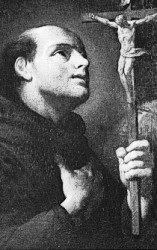
He was forced against his own wishes to undertake the duties of General of his Order, and, in his love of God and of the spreading of the Catholic Faith, sent forth brethren to preach the Gospel of Christ in Russia. He himself went through many cities of Italy, stilled the raging quarrels of the inhabitants, and recalled many of them to their obedience to the Bishop of Rome. He left nothing undone to forward the salvation of his neighbour, and brought the most depraved wretches to leave the slough of their sins, to do penance, and to love Jesus Christ. He was most earnest in prayer, and was often seen to fall into trances, while engaged in it. Virginity he so prized that to his very last breath he kept it unsullied by dint of self-imposed and stern penances.
There appeared in him an extraordinary pity towards the poor, whereof it is a famous instance that at the village of Camiliano in the territory of Siena he gave his own garment to a naked leper who asked him for an alms, and as soon as the said leper had cast it about him he was straightway cleansed of his leprosy. The fame of this miracle spread far and wide, and some of the Cardinals who had assembled at Viterbo after the death of Clement IV, to elect a successor to him, cast their eyes upon Philip, with whose heavenly wisdom they were also acquainted. When the man of God found how things stood, lest he should be constrained to take upon him the burden of the Pastoral Office, he went and hid himself on Montagnate, until Gregory X had been proclaimed Pope. By his prayers he obtained medicinal powers for the waters in these mountains, which are still called St. Philip's Baths. At length, in the year 1285, he departed this life in a most holy manner at Todi, while embracing the image of Christ hanging upon the Cross, which he called his Book. At his grave the blind received their sight, the lame walked, and the dead were raised. Pope Clement X, finding him famous for these and many other great signs and wonders, enrolled his name among those of the Saints.




